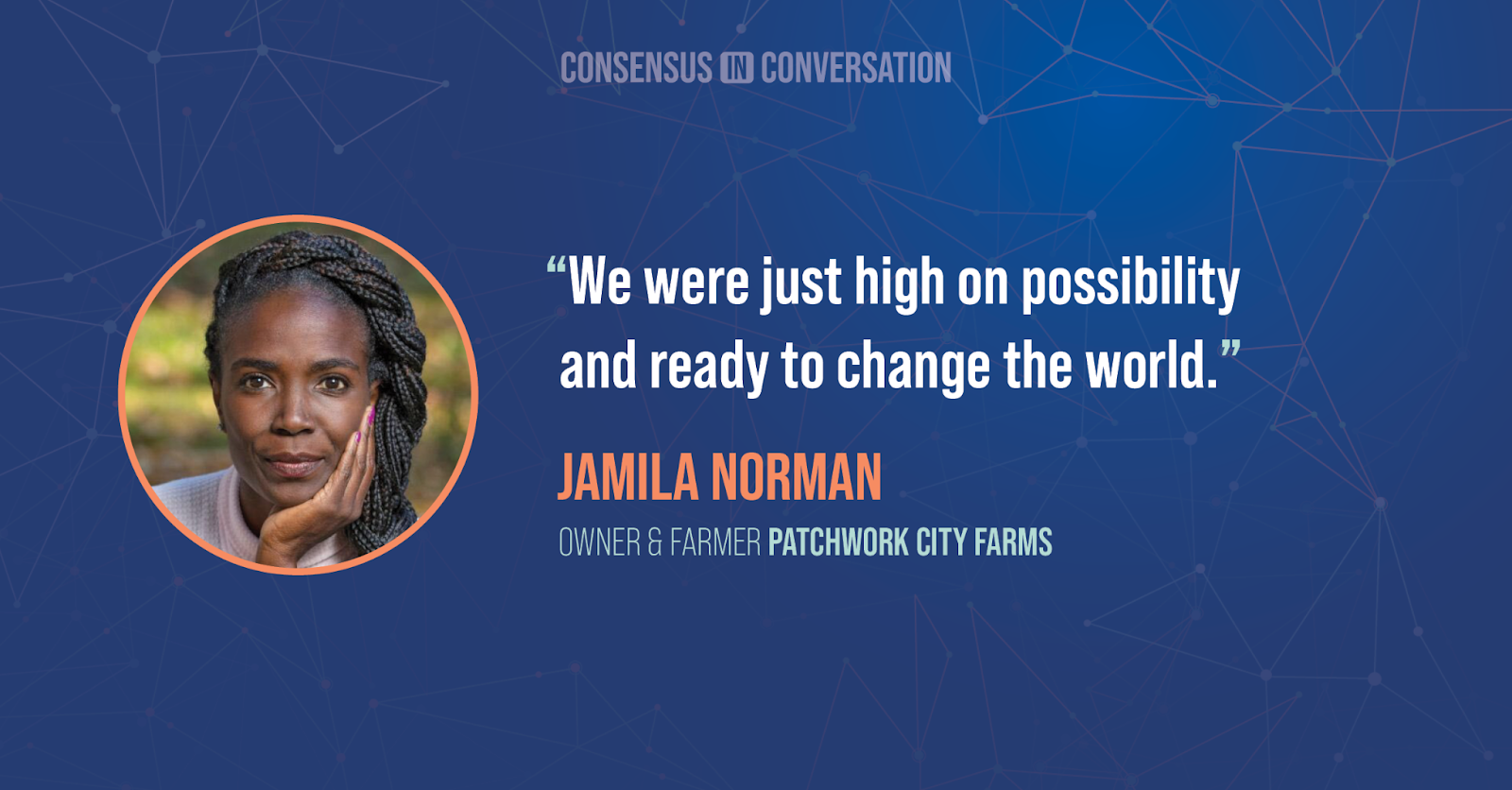
As any fan of the Magnolia Network’s Homegrown will tell you, Jamila Norman’s charisma and great sense of humor make for engaging television. But, the latest episode of Consensus in Conversation (CiC) illustrates that her work serves a far more important role than just entertainment. Jamila herself has hinted at the deeper purpose of her content. During our discussion, she explained, “[Homegrown] had to be real[.]…It’s not…[about making] it look good on TV, but [it is about giving] real information that people…can actually take away and implement.” She then continued to unravel the strategy behind the show and outlined its glowing reception. Jamila is emerging as an inspiring force for the next generation of farmers and discovered that her story is filled with useful business lessons that are applicable to many of us.
Jamila created Patchwork City Farms in 2010 with the goal of increasing access to organically grown, regeneratively harvested, and sustainable produce in her local community. She feeds hundreds of customers and has made it her personal mission to promote the wonders of local farming. Her journey shares interesting parallels to many successful entrepreneurs – long hours spent in the throes of ideation, comprehensive market research, and relationship management with stakeholders just to name a few. We learned so much by analyzing her alignment of a community-based mission with a profitable business framework. Here are a few of our favorite insights:
1. Local Communities Offer All You Need to Get Off the Ground. Launching a business can seem like a herculean task. To thrive in a competitive market, one must quickly gain proficiency in all aspects of the business from product design, to marketing, to balancing the budget, and so much more. If overconfidence and the delusion of instantaneous expertise reign supreme, the probability of failure skyrockets because one would lack the prerequisite knowledge base to make informed decisions. However, by embracing humility and learning from others, an entrepreneur can develop a growth mindset, recognize their limitations, and seek out the critical information that will facilitate long-term success. Too many mistakenly believe that the only answers to start-up questions are found in Silicon Valley and YCombinator. But, sometimes, one can learn all that they need much closer to home.
The story of Jamila Norman illustrates the life-changing power of local communities’ expertise and support. From a young age, Jamila knew that she wanted to make a positive impact, and eventually, she decided that a career in agriculture would be the best route to achieving this noble goal. The problem: she had no prior farming experience. So, Jamila conducted some research and realized that Atlanta had a small but rich agricultural tradition downtown. She knew that some of her neighbors had gone through similar struggles when founding their own farms, and she actively sought out their advice. As these other business owners shared a similar community-based mission to her, they were more than happy to reveal their strategic framework – allowing Jamila to adopt aspects of their structure into her plan. This transfer of ideas was an invaluable learning opportunity that shaped the future accomplishments of Patchwork City Farms. It is also a useful reminder to start-ups. We should mine the wealth of expertise in our own backyard and never forget to return the favor.
2. Industry Visibility Inspires the Next Generation. Agriculture is aging, and it is not a great demographic trend. The USDA’s 2022 Census estimated that the average age of a farmer was 57.5 years old while only 9% of those working in the industry were aged 35 or younger. The factors that created such a constrictive population pyramid are varied and complex. Still, one of the explanations could be the flawed but popular idea that a successful society operates on a natural progression toward a service economy. This way of thinking unfairly classifies the production of goods – including manufacturing and agriculture – as a menial task that we should outsource. The result: industries like agriculture seemed unattractive to the youth when compared to “business.” However, recent supply chain challenges have made it abundantly clear that such a point of view is mistaken and that we need to start supporting our world-class ag sector in order to create a more resilient food supply. The career provides financial stability, intellectual stimulation, and the opportunity to feed our country. So, how can we effectively share this message and change lives for the better?
Jamila offers a compelling solution: simply increasing agriculture’s visibility. Farmers are underappreciated, and many children are unaware of the high degree of sophistication in crop-growing techniques. If our youth can tangibly witness the process and benefits of agriculture, they are much more likely to consider a career in this field. On a local level, Jamila spreads this much-needed awareness by opening Patchwork to the public while emphasizing a culture of inclusivity in order to appeal to the broadest range of guests. She teaches visitors about the particulars of produce cultivation as well as taking these demonstrations directly to schools. By sharing this information, Jamila introduces kids to the rewarding world of agriculture, and her show, Homegrown, spreads this message to a national audience. Jamila summarized the goal of her strategy when she explained, “I just hope that I’m inspiring more people to come [into farming and] that we have a collective movement that creates the environment for a path to a career in ag.” If Jamila’s abundant fanmail is any indication, she is well on her way to making this vision into a reality, and the rest of the agricultural community would do well to replicate her efforts.
3. Bridging the Urban-Rural Divide Reinvigorates Our Cities. Contrary to popular belief, our cities are not spaces exclusively dedicated to commercial and industrial activity. Agriculture should be (and is increasingly becoming) a vital component of the urban fabric. City dwellers require access to affordable, nutritious food, and building farms near densely populated areas is logically the easiest way to satisfy this need. Demand for the product is high, and difference-makers, including CiC veteran Vertical Harvest, have recognized the opportunity to do well financially while serving as a force for good. They have entered into the sector en masse as it is estimated that the urban farming market size will increase from $137.5 billion currently to $281.9 billion by the end of the decade.
Jamila has established herself as a leader in this emerging market. Her sustainable practices proved to be appealing to her local community and instrumental to her financial success. As a result, many people have followed Jamila’s example and are growing food by forgoing chemical fertilizers, pesticides, and herbicides. By her own account, there were only five farms in Atlanta when Jamila started her journey in 2010. Now, this number has more than quadrupled to around 30. This proliferation of green spaces is sparking an urban renaissance by transforming derelict parking lots into productive farmland. Beyond ensuring food security, they also yield environmental benefits such as how increased soil coverage absorbs more water than asphalt – reducing the pollution associated with surface runoff. We should all start taking this niche more seriously as urban ag entrepreneurs can make a good living while setting the course for a greater future in metropolitan society.




